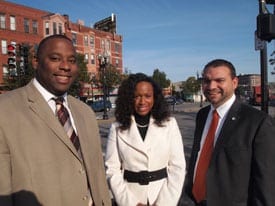
When the year 2011 dawned, the political prospects for Boston’s black community were not encouraging.
Former District 7 City Councilor Chuck Turner was facing jail time for charges he accepted a bribe. Incumbent At-Large Councilors Ayanna Pressley and Felix Arroyo were widely seen as vulnerable to a challenge.
And despite assurances of fairness from the Legislature’s Redistricting Committee, civil rights activists were gearing up for a legal fight to challenge what most expected would be a map with districts drawn to protect white incumbents at the expense of the political prospects of the state’s black, Latino and Asian communities.
Of course, the tectonic shifts that led to Pressley and Arroyo topping the ticket in the At-Large race have been years in the making. The number of black, Latino and Asian voters registered in Boston, and the willingness of whites to vote across race lines, have been increased over the last 10 years.
But this year, the conditions were set for a test of the new Boston. Pressley, the first-ever black woman elected to the council, and Arroyo were fighting to hold onto their seats after just one term in office. Both needed a strong turnout in the black, Latino, Asian and white progressive base that has traditionally supported black and Latino candidates.
While turnout in the communities of color was better than the average for the city, what no one counted on was the level of support Pressley and Arroyo received in the traditionally conservative, middle-class neighborhood of West Roxbury.
That support helped push Pressley and Arroyo into a one-two finish in this year’s race. It was the first time ever a black candidate topped the balloting in a city council race.
At the district level, candidate Suzanne Lee’s push for the District 2 seat had a similarly surprising outcome, with Lee, a political neophyte coming within 100 votes of besting incumbent Bill Linehan. Lee’s campaign waged a battle between her base in Chinatown and the South End against Linehan’s South Boston base and demonstrated the increased voting power of white liberal and Asian voters.
And if those victories weren’t proof enough of the shifting dynamics in Boston’s political scene, the Legislature’s Joint Committee on Redistricting moved the goal post forward for candidates of color seeking House and Senate seats in Massachusetts, doubling the number of majority-minority districts in the House from the current 10 to 20. The committee also drew a majority-Latino district in Springfield, increasing the number of majority-minority Senate seats from two to three.
For the first time in the state’s history, legislators drew district lines to increase the voting power of minorities without a court mandate.
As 2011 draws to a close, black and Latino political activists across the state are facing unprecedented new opportunities. When voters go to the polls on November 2012, they may well be choosing between more minority candidates than ever before.
The coming year will also bring a hotly-contested U.S. Senate race, as the Democratic Party is rumored to be channeling unprecedented resources into the Bay State in their efforts to defeat incumbent Sen. Scott Brown.
While the presidential vote is expected to go to Barack Obama in Massachusetts, the contested Senate race — with Democrat Elizabeth Warren leading the challengers — has made the state into somewhat of a battleground.
Campaign dollars flowing in from Democratic and GOP coffers could translate into record turnout in majority-black precincts, which are the state’s most solidly Democratic strongholds. That higher turnout could bode well for black, Latino and Asian candidates seeking state House and Senate seats.
If that’s the case, 2012 could well surpass the electoral benchmarks set in 2011.







